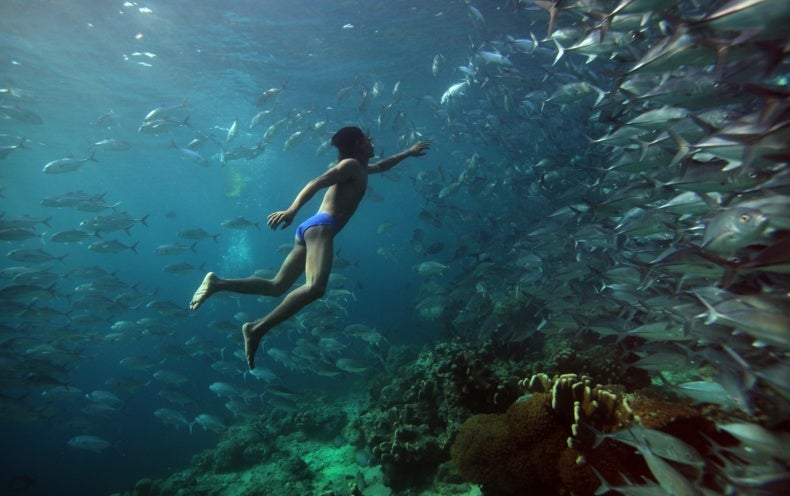"Sea Nomads" May Have Evolved to Be the World's Elite Divers
“Sea Nomads” May Have Evolved to Be the World’s Elite Divers
New genetic evidence suggests these indigenous Southeast Asians are singularly suited for underwater hunting
By Angus Chen on April 19, 2018

A Bajau freediver swims amongst a large school of Jack Fish shoaling on a reef at Sipidan Island,
Sabah, Malaysia. Credit: Timothy Allen Getty Images
When a human is submerged in water, within seconds the body begins to reflexively adjust. The heart rate slows; blood vessels in the extremities tighten, diverting blood flow to vital organs. And, crucially, the spleen constricts, expelling a precious reserve of oxygenated red blood cells into the bloodstream. All of this extends the time we can go without gasping.
Now a new study suggests some seafaring people may have evolved over thousands of years to push the limits of typical dive responses even further. Genetic changes have allowed one population in Southeast Asia to grow plus-size spleens that may enhance their breath-holding capabilities, according to an international research team’s analysis. Some scientists have likened these evolutionary adaptations to the ones that have allowed Tibetans to thrive at high elevations.
The new study dealt with people who are often locally called “Sea Nomads” and live among the islands and coastlines of Southeast Asia. “Traditionally, they live on houseboats and come to land only occasionally,” says Melissa Ilardo, a postdoctoral researcher at The University of Utah and first author on the study. “They have a reputation for being incredible divers, and for their connection to the sea. I went diving with them, and their abilities are just unreal.”
Among the Bajau—one group of people who live on houseboats in the waterways around and between the Philippines, Malaysia and Indonesia—divers have been recorded holding their breath for over five minutes while hunting for fish or shellfish. In comparison, average people might be able to stay underwater for one to two minutes, and world-class free divers can hold their breath in competitive settings for up to three or close to four and a half minutes.
More:
https://www.scientificamerican.com/article/human-sea-nomads-may-have-evolved-to-be-the-worlds-elite-divers/?utm_source=feedburner&utm_medium=feed&utm_campaign=Feed%3A+sciam%2Fevolution+%28Topic%3A+Evolution%29

